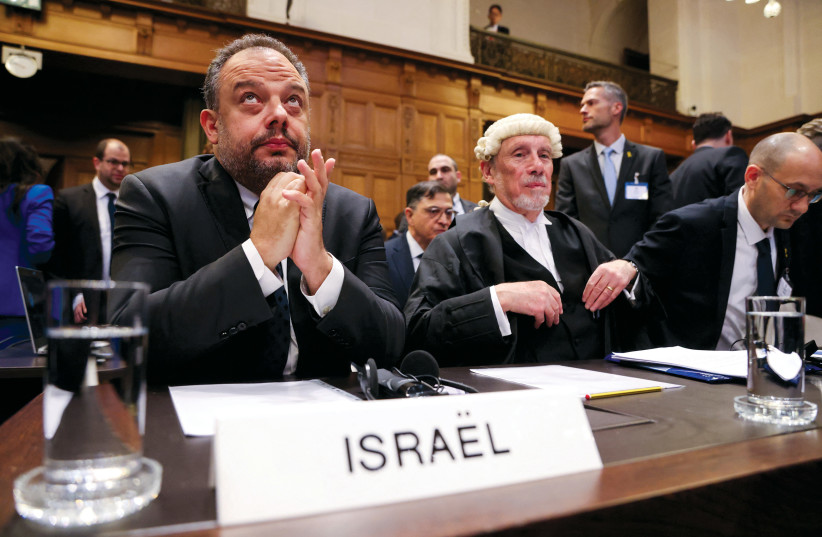International Criminal Court Prosecutor Karim Khan warned Israel on Tuesday of harsher war crimes scrutiny if it invades Rafah, as well as for its general conduct in the war. This is not a verbal threat to be shrugged away, and it may just be the most dramatic war-crimes moment for Israel to date.
There has not been any public hearing yet, the word “genocide” was not used, and Israeli officials had not issued any public response by press time, leaving Khan’s statement to be swallowed up and mostly ignored by Israeli media in favor of the hostage rescue.
But anyone who ignores Khan’s threat simply does not understand the power and influence of the ICC.
The world followed the International Court of Justice (ICJ) with bated breath last month during the two days of public hearings attended by South Africa’s and Israel’s legal teams, as well as the day of the interim decision on genocide allegations.
That the ICJ has already held hearings, asked for an update in under two weeks, and is thought of as the highest court in the land, dating back to the UN Charter more than 75 years ago, makes its prominence obvious.

The ICJ is limited in what it can do
Yet, at the end of the day, the ICJ is limited in what it can do: In a case like this, Israel could be referred back to the UN Security Council, where the US would likely veto any attempted enforcement action. In terms of actions that could be taken, it ends there.
When the ICJ ruled against Israel in 2004 in its decision that called the West Bank security barrier illegal, Jerusalem ignored the ruling – with some support from the US – with limited public-relations and economic consequences.
An ICJ ruling against Israel on genocide charges, of course, would be devastating in the public-relations, diplomacy, and economic arenas. But the chances of such a ruling are minuscule – because genocide, part of the war-crimes charges, even for this court, is the harshest and hardest to prove.
Add to that the ICJ’s lack of any enforcement mechanism.
But unlike the ICJ, the ICC has enforcement mechanisms, part of which are given a push by an international body for coordinating wanted lists, or red notices, to make arrests called INTERPOL. The ICC and INTERPOL can work together to notify countries that they should arrest specific individuals and can also campaign to press ICC members and the more than 125 member countries of the ICC – including most of Europe – to arrest anyone whom the ICC issues arrest warrants for. It is a compliance-reliant method and works only within the member states.
The ICC can even keep its arrest warrants secret to surprise international travelers who thought they were still in the clear.
Unlike the ICJ, which needs some sort of collective action, the ICC and INTERPOL can lean heavily on individual member states to make an arrest.
The US has some influence over the ICC because it is a global superpower, but it is not a member of the court, so its influence is much smaller than with the ICJ.
The ICC can indict individuals for lesser war crimes as well. Since its founding around 25 years ago, it added new lower-grade war crimes, such as “aggression.” Khan, in statements he made in the fall, said the Israeli delay of humanitarian aid – delay, not blocking – could amount to a war crime.
Put simply, there is a much higher chance of the ICC issuing arrest warrants for Israelis accused of “smaller” war crimes than there is of the ICJ ruling against Israel on the much larger question of genocide.
And this doesn’t even touch on Israel’s other problems before the ICC.
All of the focus in the last few months has been on potential war-crimes charges from the ICC for Israel’s conduct in Gaza. Many assumed that because Khan said almost nothing about the 2014 Gaza conflict for the first two-plus years of his term, he was going to take a pass on any charges related to that round.
But the ICC can also prosecute Israelis related to the settlement enterprise – and that is not off the table.
One of the reasons that Israel dropped ratification of the ICC at the last minute after being a lead sponsor (the impetus for the court was to deter genocides such as the Holocaust) was because of late additions of crimes tailored to hit Israel for the settlements.
If there could be a debate about whether settlements violate the Geneva Conventions, Arab countries added new language to broaden the definition of settlements-related war crimes so that they could be applied to Israelis.
And if Khan has kept mum on Israel for his first two years, it had been one of his loudest issues since October.
Khan will also be harder for Israel to label as simply anti-Israel. He is careful; in every statement he makes, he clarifies that he is eyeing prosecution of Hamas as well.
At the ICJ, all of the proceedings were focused on Israel, not Hamas, despite Jerusalem’s attempts to (rightly) highlight the terrorists’ war crimes and use of human shields.
Israel has many potential defenses against ICC intervention, but to date, The Hague has already dismissed some of the key ones.
On Monday, the IDF said it would issue interim reports on war-crimes probes in late March to early April.
These and other upcoming reports are Israel’s best defense against future ICC intervention: showing that Israel prosecutes its own and needs no one. On the other hand, any Israelis whose strategy is simply to ignore the issue could be in for a rude awakening.
